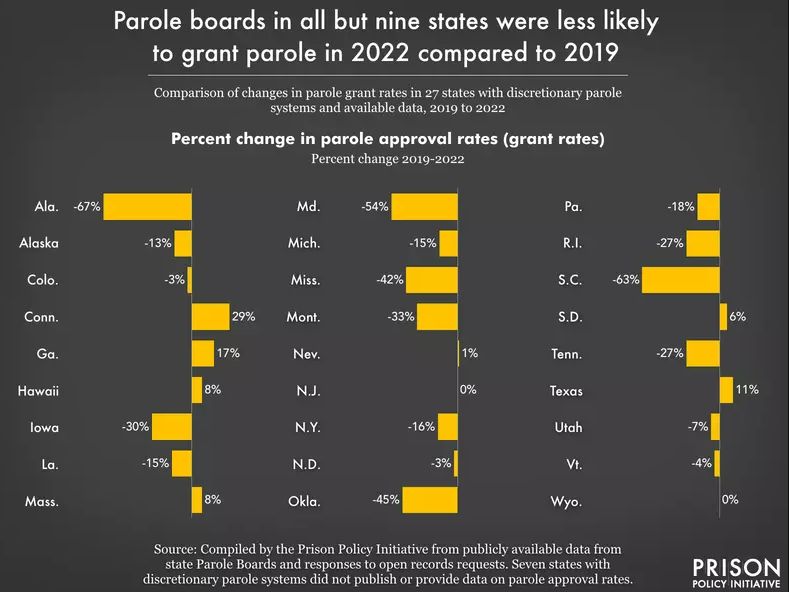Parole Rates and Hearings Sharply Decreased in Last Five Years
“What’s the point of having a second chance available when you’re not willing to give it?”

This blog has previously featured the State of Alabama's broken parole system, which also includes one case where Alabama’s Board of Pardons and Paroles denied parole to someone who had died ten days prior to their parole hearing. Nationwide, a 2023 Prison Policy Initiative study found that n the 29 states for which it collected 2022 parole approval data, only 8 had grant rates above 50%; Connecticut, Idaho, Massachusetts, Nevada, North Dakota, Utah, Vermont, and Wyoming, which had the highest grant rate of 78%.
At the other end of the scale, Alabama (10%) and South Carolina (13%) have the lowest parole approval grant rates in the nation. Though data isn't yet available from most states for 2023, South Carolina’s recently updated parole data show that the state’s parole approval rate dropped to an astonishingly low 7% in 2023.
But state parole boards did not only choose to release fewer people, they heard fewer cases as well. With the exceptions of Oklahoma, South Dakota, and Arkansas, parole boards continued to hear significantly fewer total cases in 2022 than they did in 2019. The result is that since 2019, the number of people released through discretionary parole has decreased across the board.
Denial of parole is the default disposition for parole boards, and the burden of proof is usually on the incarcerated person to justify their release. This is problematic, as the board often considers factors that are beyond the applicant’s control, such as the availability of programming or education in the prison, or factors that cannot be changed, such as the type of the offense for which they were incarcerated.
Another issue is the pervasive outlook some politicians and parole board members have toward people who are up for parole. State Representative Matt Simpson defended Alabama’s abysmal grant rates; “We’ve gotten to a point where the people up for parole are the ones that don’t need to be out; it’s not like it used to be where we had a number of non-violent offenders.”
This begs the question; how can parole boards, often filled by political appointees, with this viewpoint provide a fair hearing to those who come before them? There is nothing fair about a body that decides people’s fates before they ever appear. When parole boards solely or exclusively make their release decisions based on the underlying charge, they are continually punishing incarcerated people for a factor they cannot change.
A recent feature in Bolts Magazine examined the parole system in Virginia where, under Governor Glenn Youngkin (R), the concept of parole has essentially vanished. From January 2022 to September 2023, Virginia's Parole Board granted 2% of the cases it heard.
“I don’t know that there is a silver bullet with this board where you can present the perfect package to them that gets their attention,” said Julie McConnell, a law professor at the University of Richmond and director of a defense clinic that works on juvenile parole law cases. She suspects the board focuses more on aspects outside of the applicant’s control like the crime itself or input from the prosecutor and victim’s families. “We’ve just become so acculturated to extreme punishment that we don’t even recognize when we’re going too far. We could give people an opportunity for a fresh start.”
Read more about the Virginia Parole Board and the factors that have seen significant reductions in granting parole cases in "Under Glenn Youngkin, Parole in Virginia Has Nearly Vanished" featured at
Bolts Magazine. Bolts is a digital magazine that shines a spotlight on the levers of power that influence democracy and mass incarceration- local judges, county clerks, or prosecutors - and the political battles around them.










